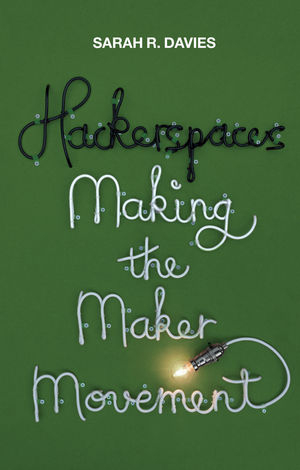
Hackerspaces
Polity Press (Verlag)
978-1-5095-0117-5 (ISBN)
Hackerspaces: Making the Maker Movement takes the rise of the maker movement as its starting point. Hacker and makerspaces, fab labs, and DIY bio spaces are emerging all over the world. Based on a study of hacker and makerspaces across the US, the book explores cultures of hacking and making in the context of wider social changes, arguing that excitement about the maker movement is not just about the availability of new technologies, but the kinds of citizens we are expected to be.
Sarah R. Davies is a Marie Curie Research Fellow in the Department of Media, Cognition and Communication, University of Copenhagen.
Preface
Acknowledgements
1. Introduction
There are a number of places this book could begin
2. Craft, DIY and Active Leisure
It started with Stitch ’n’ Bitch
3. Histories of Hacking and Making
There should be diversity in the hackerspace movement, he says
4. How do Hackerspaces Work?
Hacker and makerspaces can look, feel and smell quite different
5. The Hacker Spirit
I'm a big advocate for this sort of lifestyle and culture
6. How do Hackerspaces Really Work?
They don't have a sense of community that you find in a hackerspace
7. Exclusion
Whatever it is females like to talk about
8. Cool Projects
Rather, it was a Trojan horse
9. Emancipation and Commodification
This was a movement that could do something good
10. Who is a Hacker?
No one is claiming that involvement in a quilting circle is going to prompt a new industrial revolution
11. Conclusion
Two reasons hacking is timely, and three reasons it is conflicted
Notes
Index
| Erscheinungsdatum | 29.01.2017 |
|---|---|
| Verlagsort | Oxford |
| Sprache | englisch |
| Maße | 150 x 229 mm |
| Gewicht | 318 g |
| Themenwelt | Sozialwissenschaften ► Kommunikation / Medien ► Medienwissenschaft |
| Sozialwissenschaften ► Politik / Verwaltung | |
| ISBN-10 | 1-5095-0117-7 / 1509501177 |
| ISBN-13 | 978-1-5095-0117-5 / 9781509501175 |
| Zustand | Neuware |
| Haben Sie eine Frage zum Produkt? |
aus dem Bereich


